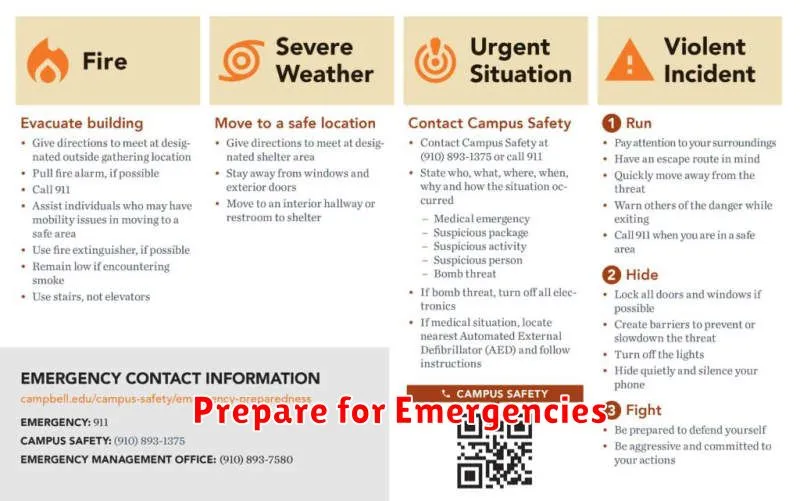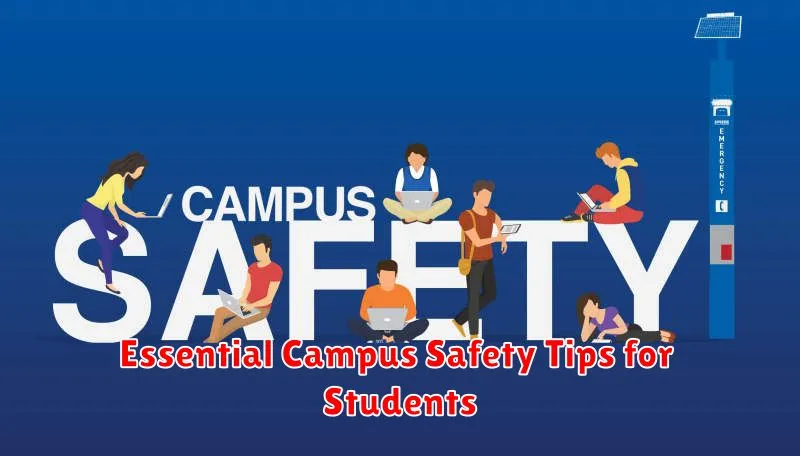College life presents exciting opportunities for learning, growth, and independence. However, it is crucial for students to prioritize their safety and well-being throughout their academic journey. This article provides essential campus safety tips to help students navigate potential risks and cultivate a secure environment on and off campus. From safeguarding personal belongings to understanding emergency procedures, implementing these strategies will empower students to protect themselves and contribute to a safer campus community. By adhering to these campus safety guidelines, students can focus on their studies and enjoy a fulfilling college experience.
Campus safety is not just the responsibility of the institution but a shared effort between students, faculty, and staff. Being proactive and informed is key to mitigating potential threats. This article covers a range of essential safety advice, including personal safety tips, dorm safety tips, and strategies for staying safe while walking alone at night. We will also explore resources available on campus, such as campus security services and counseling centers, to ensure students know where to turn for assistance in times of need. By taking campus safety seriously and implementing these student safety tips, students can create a more secure and supportive campus environment for themselves and their peers.
Know Campus Security Resources
Familiarize yourself with the campus security department and its services. Understand their role in maintaining a safe environment. This includes knowing their contact information, which should be readily accessible.
Be aware of the emergency notification systems in place. These systems may include text alerts, sirens, or email notifications. Ensure you’re registered to receive these alerts.
Identify the location of emergency phones or blue light stations around campus. These provide direct contact with security personnel in case of an emergency.
Inquire about safety escorts if you feel uncomfortable walking alone at night. Many campuses offer this service to ensure students can safely reach their destination.
Stay Aware of Your Surroundings
Maintaining awareness of your surroundings is a crucial aspect of campus safety. Distractions, such as cell phones or headphones, can limit your ability to perceive potential threats. Avoid becoming engrossed in these distractions, especially when walking alone or at night.
Be observant of the people around you. If you sense someone is following you, change your pace or cross the street. If you continue to feel uneasy, head to a well-lit, populated area or contact campus security.
Familiarize yourself with campus safety resources like emergency call boxes and designated safe areas. Knowing their locations can be invaluable in a critical situation.
Travel in Groups at Night
Whenever possible, avoid walking alone at night, especially in poorly lit or isolated areas. Safety in numbers is a key principle. Traveling in groups significantly reduces your risk of becoming a target for crime.
If you must travel at night, try to arrange for a friend or classmate to accompany you. Communicate your travel plans to someone you trust, letting them know your destination and estimated arrival time.
If group travel isn’t an option, consider utilizing campus security resources such as escort services or campus shuttles. Familiarize yourself with their operating hours and contact information.
Use Campus Escort Services

Many campuses offer escort services, especially during evening hours. These services typically involve security personnel or student volunteers accompanying you to your destination on campus. Don’t hesitate to use this service if you feel uncomfortable walking alone, particularly at night or in poorly lit areas.
Familiarize yourself with the specific procedures for requesting an escort on your campus. This information is usually available on the campus security website or in student handbooks. Knowing the process beforehand can save valuable time in situations where you need assistance quickly.
Keep Your Dorm Secure
Your dorm room is your personal space and should be treated as such. Always lock your door, even when you’re just stepping out for a moment. An unlocked door is an invitation for theft.
Be mindful of who you allow into your room. Don’t prop doors open for extended periods, and avoid letting strangers in. If someone claims to be maintenance or staff, ask for identification.
Secure your valuables. Consider using a small safe for important items like laptops, jewelry, and cash. Don’t leave valuable electronics visible from windows or hallways.
Attend Campus Safety Seminars
Campus safety seminars are invaluable resources for students. These seminars provide essential information on a variety of safety topics, from personal safety and crime prevention to emergency preparedness and fire safety.
Attending these seminars allows you to learn about campus-specific safety protocols, resources available to you, and effective strategies for protecting yourself and your belongings. They also offer a chance to ask questions and connect with campus safety personnel.
Check your university’s website or student handbook for a schedule of upcoming safety seminars. Make it a priority to attend at least one during your time on campus.
Utilize Safety Apps and Alerts
Enhance your safety on campus by utilizing safety apps and alert systems. Many universities offer their own safety apps that provide real-time alerts about emergencies, crime incidents, and campus closures. These apps may also include features such as virtual escorts, emergency contact information, and mobile blue light systems.
Familiarize yourself with your university’s specific safety app and its capabilities. Enable push notifications to receive timely alerts. In addition to university-provided apps, consider exploring other personal safety apps that offer features like location sharing with trusted contacts and emergency alerts based on your location.
Communicate Regularly with Family
Staying in touch with family and friends while at college is crucial for safety and well-being. Regular communication provides a support system and a way for loved ones to know you’re okay. Share your schedule with someone you trust, including classes, work, and social activities. Let them know your general whereabouts.
Establish a check-in routine, whether it’s a daily text message, a weekly phone call, or a video chat. This provides a sense of normalcy and allows someone to notice if you unexpectedly become unreachable. While respecting your independence, consistent contact ensures that someone is aware of your routine and can raise concerns if needed.
Report Suspicious Activities Immediately
If you see something, say something. This is a critical aspect of campus safety. Reporting suspicious activity helps protect yourself and the entire campus community.
Suspicious activity can include unusual or unfamiliar individuals loitering, unauthorized access to restricted areas, or behavior that makes you feel uncomfortable or threatened. It could also involve witnessing potential criminal activity or observing abandoned packages or bags.
Don’t hesitate to contact campus security or local law enforcement. Your prompt action can make a significant difference.
Prepare for Emergencies

Being prepared for emergencies is crucial for your safety on campus. Familiarize yourself with the emergency procedures specific to your university, including evacuation routes, emergency contacts, and designated safety zones.
Build an emergency kit containing essential supplies. This should include a first-aid kit, flashlight, batteries, non-perishable food items, and bottled water. Consider any personal medical needs when assembling your kit.
Sign up for campus emergency alerts. Most universities utilize text message or email alert systems to notify students of critical incidents. Ensure your contact information is up-to-date in the university system.

